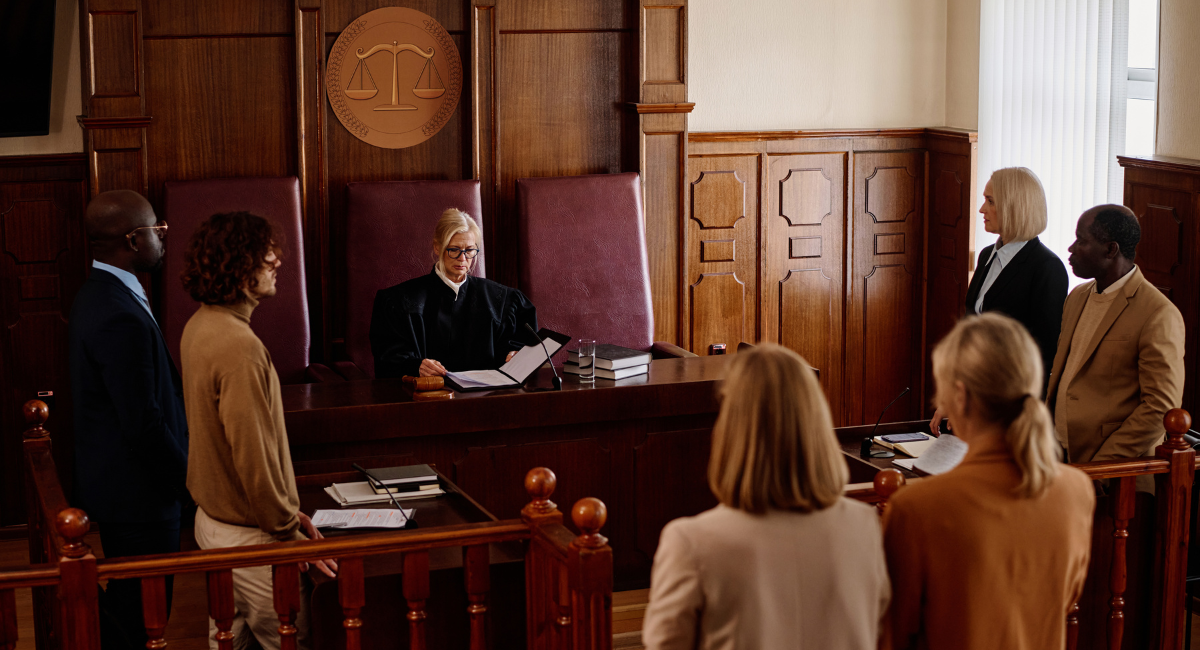Facing a DUI charge in Texas can feel like standing on the edge of a legal cliff. One moment you’re getting pulled over, and the next you’re navigating a courtroom filled with unfamiliar faces and legal jargon. While the arrest itself is stressful, the court process that follows can be even more overwhelming if you don’t understand how it works. That’s why it’s important to have the Texas DUI trial process explained in a way that’s not only accurate but also easy to follow.
In this article, we’ll walk through the entire Texas DUI trial process—step by step—from arrest to final verdict. Along the way, we’ll share real-life examples, practical advice, and insight into the strategies that often influence the outcome. Whether you’re preparing for court yourself or supporting someone else through it, this guide is here to give you the confidence to face the system head-on.

What Happens After a DUI Arrest in Texas?
The First Hours Matter
After a DUI arrest in Texas, the process begins almost immediately. You’ll be taken to jail, booked, and typically held for several hours before being released on bond or personal recognizance. But the legal process doesn’t stop there. Within days, you’ll receive documents outlining your charges, a court date, and information about your license suspension.
This early stage is often where confusion sets in. Many people wrongly assume that the worst is over once they’re out of jail. In reality, the legal battle is just beginning. Getting the Texas DUI trial process explained early can help prevent costly mistakes right out of the gate.
Administrative License Revocation (ALR) Hearing
A Separate But Critical Step
Texas has a dual-track system when it comes to DUI charges. In addition to the criminal court case, you’ll also face an Administrative License Revocation (ALR) hearing. This civil proceeding is completely separate from your criminal trial but plays a major role in whether you can keep your driver’s license.
You must request an ALR hearing within 15 days of your arrest. If you don’t, your license will be automatically suspended—even before your criminal trial begins.
At the ALR hearing, the judge will examine:
- Whether the officer had reasonable suspicion to stop you
- Whether you were properly arrested
- Whether you refused or failed a blood or breath test
This hearing is an early chance for your attorney to assess the officer’s case and potentially uncover weaknesses that could benefit your defense later.
Understanding the ALR hearing is key to having the Texas DUI trial process explained in full.
First Court Appearance: Arraignment
Where You Enter a Plea
Your first formal court appearance is the arraignment, where the judge reads the charges against you and asks how you plead: guilty, not guilty, or no contest.
Most defense attorneys will advise you to plead not guilty at this stage. Why? Because it buys you time to gather evidence, negotiate with the prosecutor, and build your defense strategy.
During arraignment:
- You may be required to attend in person or appear virtually
- Bail conditions may be reviewed or adjusted
- The court sets future hearing dates
Although this step may seem procedural, it sets the tone for your entire case. This is where the Texas DUI trial process explained as a legal roadmap really begins to take shape.
Pretrial Motions and Discovery
Where Legal Battles Quietly Begin
The pretrial phase is where your attorney can shine. During this stage, both sides exchange evidence in a process called discovery. Your defense team will receive:
- Police reports
- Dashcam or bodycam footage
- Breath or blood test results
- Witness statements
- Lab records

Your attorney may also file pretrial motions such as:
- Motion to suppress evidence (e.g., improper traffic stop)
- Motion to dismiss charges (if rights were violated)
- Motion for a change of venue
This stage is crucial because strong motions can lead to reduced charges or even dismissal. It’s the part of the Texas DUI trial process explained that most people never see—yet it plays a powerful role in shaping the outcome.
Plea Bargain vs. Trial: Making the Call
Weighing Your Options
At this point, your defense team and the prosecution may engage in plea negotiations. The prosecutor might offer a deal that reduces your charges or penalties in exchange for a guilty or no-contest plea.
Common plea outcomes include:
- Reduced charge to Obstruction of a Passageway
- Probation instead of jail
- Lesser fines
- Agreement to attend DWI education programs
Whether to accept a plea or go to trial depends on:
- The strength of the state’s evidence
- Your criminal history
- The risks of conviction at trial
Having the Texas DUI trial process explained helps you make an informed choice between accepting a deal or going to court.
Jury Trial: What to Expect
When Your Case Goes to Trial
If you and your attorney decide to go to trial, the process officially begins. You’ll appear in court for jury selection, known as voir dire. Attorneys from both sides question potential jurors to ensure fairness and eliminate bias.
A DUI trial in Texas typically involves:
- Opening statements from both sides
- Presentation of the prosecution’s evidence
- Cross-examination by the defense
- Defense witnesses and evidence (if any)
- Closing arguments
- Jury deliberation and verdict

Each stage of trial matters. Jurors will evaluate not just evidence but also your demeanor, the credibility of witnesses, and the clarity of the legal arguments presented.
That’s why having the Texas DUI trial process explained in detail is so valuable—it removes the guesswork from a very high-stakes environment.
Real-Life Example: Trial Victory in Harris County
Carlos, a 29-year-old accountant, was charged with DWI after being pulled over late at night. He refused the breath test and was arrested based on the officer’s observations alone.
At trial, Carlos’s lawyer challenged the officer’s testimony, highlighting inconsistencies between the police report and dashcam footage. The jury deliberated for less than an hour and returned a not guilty verdict.
Carlos’s case shows that while risky, going to trial can be the right move—especially when the state’s case is weak.
Sentencing: If You’re Convicted
What Happens After a Guilty Verdict
If the jury finds you guilty or you accept a plea deal, the judge will issue a sentence. For a first-time DWI in Texas, penalties may include:
- Jail time (3 days to 180 days)
- Fines up to $2,000
- License suspension (90 days to 1 year)
- Probation with regular check-ins
- Community service (24 to 100+ hours)
- DWI education classes
If your BAC was 0.15% or higher, or if you had a child passenger, you may face enhanced penalties.
This is often the most emotionally difficult part of the Texas DUI trial process, but knowing what to expect helps you prepare mentally and logistically.
Appeals and Post-Conviction Relief
When the Verdict Isn’t the End
If you’re convicted, you still have the right to appeal the decision. Grounds for appeal may include:
- Judicial error
- Prosecutorial misconduct
- Ineffective legal representation
- Improper admission of evidence
Filing an appeal doesn’t erase your conviction immediately, but it can lead to a new trial, a reduced sentence, or even a complete dismissal.
Getting the Texas DUI trial process explained includes knowing how to continue your defense even after sentencing, especially if your trial wasn’t handled fairly.
Collateral Consequences of a DUI Conviction
The Long-Term Ripple Effects
Beyond legal penalties, a DUI conviction can affect your life in many other ways:
- Employment issues due to background checks
- Higher insurance premiums for years
- Loss of professional licenses
- Difficulty securing housing
- Restricted travel to certain countries

These collateral consequences are why many defendants fight hard to avoid a conviction—even if it means taking their chances at trial.
Understanding these risks is a critical piece of the Texas DUI trial process explained through a practical, real-life lens.
Real-Life Example: Reduced Sentence Through a Plea Deal
Tina, a nurse in El Paso, was charged with DWI after being pulled over during a holiday weekend. Her BAC was 0.10%, and it was her first offense.
Her lawyer negotiated a deal where Tina pled no contest to a lesser charge. In return, she received probation, avoided jail time, and completed an alcohol education course. The charge was later eligible for non-disclosure, which helped protect her job.
Her story illustrates how strategic decision-making can shape a much more manageable outcome.
Final Thoughts on Texas DUI Trial Process Unveiled: What to Expect
The DUI trial process in Texas can feel intimidating—but knowledge is power. From the initial arrest to the final verdict, every phase of the journey involves opportunities to assert your rights and fight for your future.
Whether you’re deciding how to plead, exploring evidence challenges, or preparing for trial, having the Texas DUI trial process explained clearly can reduce stress, strengthen your defense, and help you make confident, informed choices.
If you or someone you care about is facing DUI charges, don’t go into it blindly. Talk to a qualified attorney, understand the timeline, and use this guide as a roadmap. Because when it comes to your freedom and your future, being prepared is everything.

